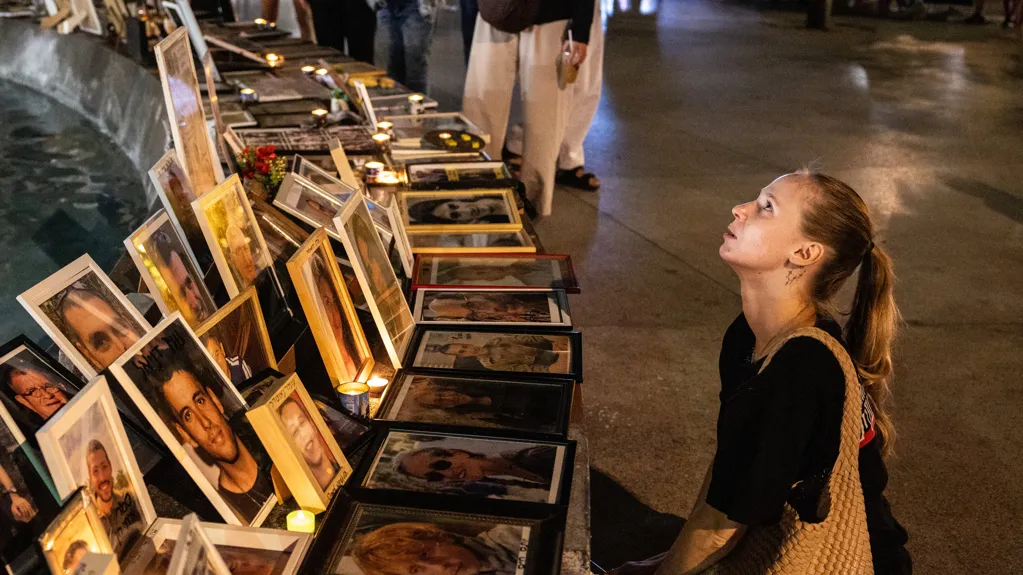Israel and Hamas have reached an agreement to release hostages and prisoners. Our colleague Jodi Rudoren explains this critical moment.
I'm a former Jerusalem bureau chief.
The longest and deadliest war in the century-old Israeli-Palestinian conflict may be about to end. Israel and Hamas said they had agreed to the first phase of President Trump's cease-fire plan: All hostages abducted from Israel will be exchanged for Palestinian prisoners, Israeli troops will pull back, and humanitarian aid will enter Gaza.
The breakthrough, which Trump announced on social media last night, came two years and a day after the Hamas terror attack on Israel that sparked the assault on Gaza. It was the middle of the night in the Middle East, but Israelis and Palestinians stayed glued to the news and reacted with intense emotion. "That's it, it's over!" the mother of one of the hostages said on Israeli TV as family members cheered in the background. In Gaza, an English teacher said he felt "joy for the end of the war and the killing, and sorrow for everything we've lost."
Details of the deal remain unclear, but the release of the 20 hostages believed to still be alive in Gaza is expected as soon as Sunday, when Trump has said he might travel to the region. (The bodies of 28 others will be released in stages.) Trump's plan calls for the release of 250 Palestinian prisoners serving life sentences and of 1,700 Gazans who have been detained during the war in exchange.
The toll
The war that began with the deadliest day for Jews since the Holocaust -- 1,200 were killed and 250 kidnapped by Hamas fighters who broke through the fence from Gaza -- has displaced nearly all of Gaza's two million residents and destroyed most of its buildings. Israeli bombs and bullets killed more than 67,000 Palestinians, according to the Gaza health ministry, nearly a third of them under 18 years old; the United Nations estimates that 500,000 are at risk of starvation.
Israel has meanwhile scored major military victories against its other enemies in the region: Iran, Hezbollah in Lebanon and the Houthis in Yemen. But it has become isolated -- accused of genocide in the International Criminal Court and subjected to academic, cultural and economic boycotts. Antisemitic harassment and violence have spiked around the world.
Hamas has lost its military and political leadership and most of its arsenal. Trump's plan calls for its disarmament and departure from Gaza. Overnight statements about the agreement from Hamas, Israel, Trump and Qatar did not mention the militant group's weapons, and Israel's statement did not say anything about withdrawing its troops from Gaza.
Our reporters on the ground in Israel, Gaza, Egypt, Washington and around the world are providing live updates as they unfold. Here are the details of Trump's 20-point plan.
Breakthrough
'A great day.' Trump's Truth Social post announcing the deal heralded a "Historic and Unprecedented Event." Prime Minister Benjamin Netanyahu called it "a great day for Israel" and said he would convene his government Thursday to sign off on the deal. Hamas called on Trump and others to ensure that Israel fully implements the agreement and not to "allow it to evade or delay."
Who's at the table. The talks began Monday, a week after Trump unveiled his plan alongside Netanyahu at the White House. They are taking place in Sharm-el-Sheikh, an Egyptian coastal resort town that has been the site of numerous peace conferences and Israeli-Palestinian negotiations. On Wednesday, Trump's son-in-law Jared Kushner and his Middle East envoy, Steve Witkoff, joined Netanyahu's top aide, Qatar's prime minister and Egypt's intelligence chief at the table.
Hostage families. The main group representing them said the agreement had provoked "a mix of excitement, anticipation, and concern" among its members. It expressed "profound gratitude" to Trump and warned the Israeli government that "any delay could exact a heavy toll."
